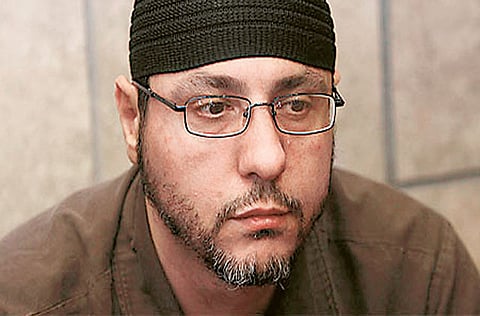Palestinian prisoners on hunger strike against solitary confinement
Prisoner Abdullah Ghaleb Al Barghouti denied the chance to see newborn daughter

Ramallah: Palestinian prisoners in four Israeli jails went on a hunger strike on Sunday in protest against the Israeli solitary confinement policy applied against tens of prisoners who have been denied their basic human rights and mainly the right to get family visits.
The Palestinian Prisoners Club called on the Red Cross and the other international concerned organisations to get immediately involved to grant the Palestinian prisoners their basic rights and get human treatment.
Palestinian prisoners landing in isolation cells are denied all their basic rights and spend days without water and no access to the prison canteens.
Qadora Fares, who heads the Palestinian Prisoners Club, told Gulf News that the Palestinian prisoners have recently been living under miserable conditions where the Israeli authorities have accelerated their aggression against them.
He stressed that the Israeli authorities impose fines on prisoners for no strong reasons, and deny them the right to get enough clothes and provide them with bad food.
He added that prisoners in solitary confinements enjoy no medical care and most of them fall sick due to the miserable conditions.
Fares said that the civil and legal international organisations should stand up for their responsibilities and put an end to the Israeli aggression in the jails.
He stressed that the Palestinian prisoners behind the Israeli jails live under daily threats and get their cells searched almost on daily, with Israeli threats to bring in more troops to the prisons.
For the entire month of May, the Palestinian Prisoners Club said that all the Palestinian prisoners have been denied the right to get family visits, where those in solitary confinement are permanently denied the right to get family visits.
The case of Abdullah Al Barghouti
The Ofar Military Court rejected on Saturday a petition submitted by Abdullah Ghaleb Al Barghouti, who lives in an isolation cell in Ashkelon Prison to get a short and silent visit of his newborn daughter.
The legal and human rights groups condemned the decision of the military court branding the court's decision as inhuman, which motivated the prisoners to go on a hunger strike in support of the prisoners in solitary confinement.
Al Barghouti received the on the same day the longest imprisonment in the Palestinian history (67 life time imprisonments) submitted the petition to the military court to get a chance to see his newly born baby Safa'a.
The Israeli military authorities have indicted Al Barghouti with 109 accusations, holding him responsible for the death of 66 Israelis and wounding more than 500 of them.
Al Barghouti born in Kuwait in 1972 managed to return to his hometown of Beit Rema near Ramallah was arrested by the Israeli authorities who sentenced him to hundreds of years in jail.
After the Ofar Military Court passed its verdict on Al Barghouti, his full concentration was focused on seeing his newly born baby and his lawyers submitted the petition to the court which claimed to have reviewed it but strongly rejected it.
The lawyers of Al Barghouti said that the court's rejection of the petition was baseless and that the nature of the petition was based on humanitarian grounds giving Al Barghouti a chance to have a look on his new born baby, vowing in the petition that the visit would be short and silent, but the court never put that into account.
The Palestinian Prisoners Club urged the international legal and human rights organizations to play an active role in pressing the Israeli authorities to give Al Barghouti a chance to have a look on his baby.



